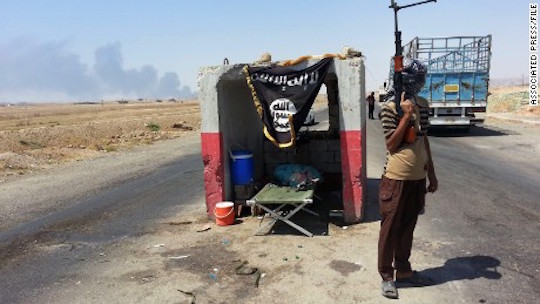The Islamic State is the combination Pizza Hut/Taco Bell of 21st-century geopolitics. It’s a terrorist organization and a state. It’s a brutal army and a pious theocracy. It’s our enemy, but it is also our fault. The only way ISIS is not like a Pizza Hut/Taco Bell is that it is not profitable. Back in January, it cut its fighters pay by half. Last week, the Washington Post announced that it was paying $50 a month1—more if you have a wife and/or sex slave—and was struggling to supply electricity and medicine to the regions it controls. It turns out ISIS is good at taking over Iraq but bad at running it. Of whom does that remind me?
Anyway, ISIS is definitely a problem, but maybe it’s one of those problems that will solve itself. Terrifying black-clad monsters though they are, they still kill fewer Amercians than bathtubs. Maybe they’re days away from developing intercontinental ballistic missiles because they’re saving so much money on gas, but they recently instructed their fighters not to use ISIS vehicles for personal trips. And there’s this from the Post, suggesting that the mechanics of conquest work against the apparatus of a functioning state:
Still another [ISIS announcement,] posted in January in Mosul, the caliphate’s Iraqi capital, hints at shortages of drugs and medical supplies, caused in part by medical professionals selling their stocks to help finance their flight from the Islamic State. The document forbids all subjects from removing or selling pharmaceuticals or medical equipment without permission.
It turns out our plan to remake Iraq and Syria as a religious utopia antithetical to modernity damaged the economy. Please resist the urge to sell it for parts. It’s important to note, here, that a lot of ISIS’s money troubles over the last six months stem from the financial strain of having US-made explosives rain down upon them every time the sun comes up. They would probably be doing better if their stuff weren’t all blown up. But despite our presidential candidates’ cross-party consensus that we need to do something about ISIS, what we’re doing now seems to be working pretty well.
At least it would be, if we regarded the Islamic State as an actual state. If Russia or North Korea were in this condition, we would rest assured they were about to tip over. But because we think of ISIS as a terror organization and not a state, neutralizing their ability to hurt us is not enough. We have to eradicate them.
Part of that is probably guilt at having unleashed them in the first place. Colin Powell’s famous Pottery Barn Dictum on Iraq—if you break it, you buy it—applies here. We broke Saddam Hussein’s bad but, in retrospect, stabilizing government, and now the whole region is our problem. But ISIS the state is only marginally more evil than Iran or Assad’s Syria. If either of those states were reduced to the condition that ISIS is in now, we would declare victory.
But our attitude toward terrorism is different from our attitude toward states. We are content to let enemy nations languish under their own dysfunctional systems. But terror must be eliminated. By definition, terror upsets us out of proportion to its actual, concrete effects. So even a broke ISIS would be a pressing problem, and this struggling ISIS is as terrifying to us as the healthier one we feared last year.
Maybe we should rethink our position. The Islamic State as very bad, and the things it does to people in Iraq and Syria—along with our responsibility for creating the conditions that made it all possible—might be enough to justify another land war in the Middle East. But the threat ISIS poses directly to us might not. It’s possible ISIS needs our war to survive. What would happen if we didn’t give it to them?




